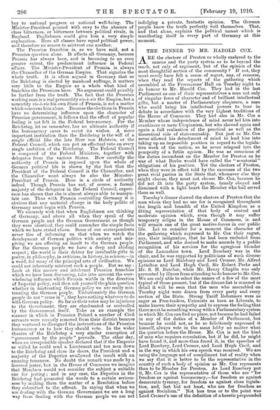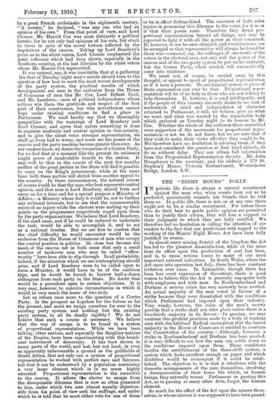THE DINNER TO MR. HAROLD COX.
ARE the electors of Preston so wholly enslaved to the caucus and the party system as to be beyond the reach, not only of argument, but of the opinion of the most thoughtful section of the community ? If not, they must surely have felt a sense of regret, nay, of remorse, when they read the reports of the gathering which assembled at the Freemasons' Hall on Tuesday night to do honour to Mr. Harold Cox. They had in the last Parliament as one of their representatives a man not only of singular force of character and of brilliant intellectual gifts, but a master of Parliamentary eloquence, a man who could bring his intellectual powers to bear in debate in accordance with the very highest traditions of the House of Commons. They had also in Mr. Cox a Member whose independence of mind never led him into crankiness or mere Utopianism, but who showed again and again a. full realisation of the practical as well as the theoretical side of statesmanship. But just as Mr. Cox never allowed his detachment of mind to lead him into taking up an impossible position in regard to the legisla- tive work of the nation, so he never relapsed into the pomposity of a futile egoism. He was as conscious of the duties incumbent on the Member for Preston as he was of what Burke would have called the " senatorial" obligations of his position. Yet the electors of Preston, when they were in effect told by the caucuses of the two great rival parties in the State that, whomever else they might choose, they must not choose Mr. Cox, because he did. not fit into the party system, tamely obeyed and dismissed with a. light heart the Member who had served them so well.
Tuesday's dinner showed the electors of Preston that the man whom they had no use for is recognised throughout the length and breadth of the United Kingdom as a fitting representative of that body of central and moderate opinion which, even though it may suffer temporary eclipse in the House of Commons, is and will remain one of the great motive-forces in our public life. Let us consider for a moment the character of the gathering which expressed to Mr. Cox their regret, nay, their indignation, that he had been excluded from Parliament, and who desired to make amends by a public recognition of his services for the egregious blunder of the Lancashire town. Lord Rosebery was in the chair, and he was supported by politicians of such diverse opinions as Lord Halsbury and Lord Cromer, Mr. Alfred Lyttelton and Lord Hugh Cecil, Sir Robert Perks and Mr. S. H. Butcher, while Mr. Henry Chaplin was only prevented by illness from attending to do honour to Mr. Cox. We are only able to select the names of a few of the most typical of those present, but if the dinner-list is scanned in detail it will be seen that the men who assembled on Tuesday night were drawn from every party and every section of the State. Strong Tariff Reformers were as eager as Free-traders, Unionists as keen as Liberals, to make known their sympathy and to express the feeling that there must be something wrong with a Parliamentary system in which Mr. Cox can find no place, not because he had failed in any of the duties of a Member of Parliament, but because he could not, as he so felicitously expressed it himself, always vote in the same lobby no matter what the question before the House. Mr. Co; is not the kind of man who requires consolation, but if he did, he might have found it, and more than found it, in the speeches of Lord Rosebery, Lord Cromer, and Lord Hugh Cecil, and in the way in which his own speech was received. We are using the language not of compliment but of reality when we say that it is better to be the representative in the country of such a body of opinion as Mr. Cox represents than to be Member for Preston. As Lord Rosebery put it, Mr. Cox is the representative of those who are " for freedom as against bureaucracy,—for freedom as against democratic tyranny, for freedom as against class legisla- tion, and, last but not least, who are for freedom as against Socialism." Not less true or to the point was Lord Cromer's use of the definition of a heretic propounded by a great French ecclesiastic in the eighteenth century. " A heretic," he declared, " was any one who had an opinion of his own." From that point of view, said Lord Cromer, Mr. Harold Cox was most distinctly a political heretic, for he not only had opinions of his own, but stuck to them in spite of the moral torture inflicted by the inquisitors of the caucus. Taking up Lord Rosebery's point as to the silent voters, Lord Cromer emphasised the ,great influence which had been shown, especially in the Southern counties, at the last Election by the silent voters whom Mr. Harold Cox represented. It was natural, nay, it was inevitable, that at a gathering ike that of Tuesday night men's minds should turn to the question of how best to meet the most recent developments of the party system, the practical results of which developments are seen in the exclusion from the House of Commons of men like Mr. Cox, Lord Robert Cecil, and Mr. Lambton,—men of political independence whose actions win them the gratitude and respect of the best part of their countrymen, but who nevertheless cannot hope under existing conditions to find a place in Parliament. We need hardly say that we thoroughly sympathise with the warnings of Lord Rosebery and Lord Cromer, and agree that unless something is done to organise moderate and central opinion in this country, and to give the silent voter stronger representation, we shall go from bad to worse, and must see the power of the caucus and the party machine become greater than ever. As our readers know, we desire the formation of a Centre Party, for we feel that at a moment like the present its existence might prove of incalculable benefit to the nation. It may well be that in the course of the next few months neither of the great parties in the State will find it possible to carry on the King's government, while at the same time both these parties will shrink from another appeal to the country. In these circumstances, the natural course of events would be that the man who best represents central_ opinion, and that man is Lord. Rosebery, should form and carry on for a time and for a special purpose a Ministry of Affairs,—a Ministry whose duty it would be, not to further any sectional interests, but to see that the commonwealth received no injury while the electors were mating up their minds on the programmes respectively urged upon them by the party organisations. We believe that Lord. Rosebery, if the need came, and if he could be induced to undertake the task, would be able to accomplish it, and to act as a national trustee. But we are free to confess that the chief difficulty he would. encounter would be the exclusion from the House of Commons of men who occupy the central position in politics. So close has become the mesh of the caucus net in both cases that only a small number of moderate men who may be called " office- worthy " have been able to slip through. In all probability, indeed, if the situation which we are contemplating should arise, and if Lord Rosebery were to be called upon to form a Ministry, it would have to be of the coalition type, and he would be forced to borrow half-a-dozen colleagues from each party in the State. No doubt that would be a procedure open to certain objections. It is very easy, however, to conceive circumstances in which it would be very much the lesser of two evils.
Let us return once more to the question of a Centre Party. Is the prospect as hopeless for the future as for the present, and must we resign ourselves for ever to the existing party system, and nothing but the existing party system, in all its deadly rigidity ? We do not believe that such a course is necessary. We believe that the way of escape is to be found in a system of proportional representation. While we have been talking, other nations, and especially the daughter-nations of the Empire, have been experimenting with this benefi- cent instrument of democracy. It has been shown in many parts of the world, and last, but not least, in even so apparently unfavourable a ground as the goldfields of South Africa, that not only can a system of proportional representation be worked with perfect ease and fairness, but that it can be understood by a population containing a very large element which is in no sense highly educated. Proportional representation is the corrective to the caucus. It allows tie elector to escape from the disreputable dilemma that is now so often presented to him, under which two men almost equally objection- able from his point of view seek his suffrage, and under which he is told that he must either vote for one of them or be in effect disfranchised. The caucuses of both sides rejoice in presenting this dilemma to the voter, for it is on it that their power rests. Therefore they dread pro- portional representation beyond all things, and may be expected to fight it with all the power at their command. If, however, it can be once obtained, and constituencies can be arranged so that representation will always be found for those who command, say, tho suffrages of one-tenth of the voters in the electoral area, not only will the power of the caucus and of the two-party system be put under restraint, but the Centre Party, when needed, will automatically come into existence.
We must not, of course, be carried away by this thought, or appear to speak of proportional representation as if it were a panacea. No mechanical system or piece of State organisation can ever be that. Proportional repre- sentation will be of no help to those who are not willing to help themselves. If, however, it is used intelligently, and if the people of this country sincerely desire to see men of moderation of mind and independence of character returned to Parliament, it will, we believe, give us what we want, and what was wanted by the remarkable body which gathered on Tuesday night to do honour to Mr. Cox. Whether the whole of the audience there assembled were supporters of the movement for proportional repre- sentation or not we do not know, but we are sure that if they wish to make their views effective they ought to be. We therefore have no hesitation in advising them, if they have not considered the question at first hand already, to do so without delay. They can obtain full information from the Proportional Representation Society. Mr. John Humphreys is the secretary, and his address is 179 St. Stephen's House, Victoria Embankment, Westminster Bridge, London, S.W.









































 Previous page
Previous page